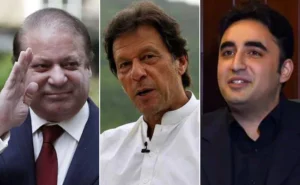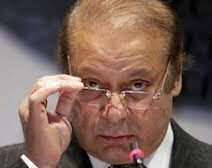The News Freedom
Chandigarh, February 9
Early claims of victory by former Prime Minister Nawaz Sharif were dashed today as independent candidates aligned with his rival, Imran Khan, took a surprising lead in Pakistan’s ongoing election count. News agencies reported that Sharif, acknowledging the lack of a clear majority for his party, pivoted towards forming a coalition government. He instructed his brother, Shehbaz Sharif, to reach out to other parties for potential partnerships.
“We invite allies to join the coalition…to pull Pakistan out of its problems,” said Nawaz Sharif, marking a shift from his earlier preference for a single-party government.
Sharif’s Pakistan Muslim League (PML-N) appeared poised for the largest number of seats based on initial results. However, as more data trickled in, independent candidates supported by Khan’s Pakistan Tehreek-e-Insaf (PTI) surged ahead, throwing the formation of a new government into uncertainty.

The Independent relayed Nawaz Sharif’s assertion of victory in Pakistan’s general elections, despite the current lead held by independent candidates aligned with Imran Khan, with counting still underway. Sharif proclaimed his Pakistan Muslim League as the foremost entity following the announcement of over 150 National Assembly results. The outlet underscored the unexpected ascendancy of independent candidates supported by imprisoned former Prime Minister Imran Khan, counter to assertions by Khan’s supporters and a national watchdog that electoral procedures favored Sharif.
Adding to the intrigue, reports emerged of irregularities and manipulation favoring Sharif, as claimed by Khan’s supporters and a national rights body. However, international media like The New York Times attributed the rise of Khan-backed independents to the failure of the military’s alleged attempt to undermine their influence.
As counting continues, it remains unclear whether Khan’s loyalists will maintain their advantage or if Sharif’s coalition efforts will materialize. The final outcome will have significant implications for Pakistan’s political future and its relationship with regional and international players.
